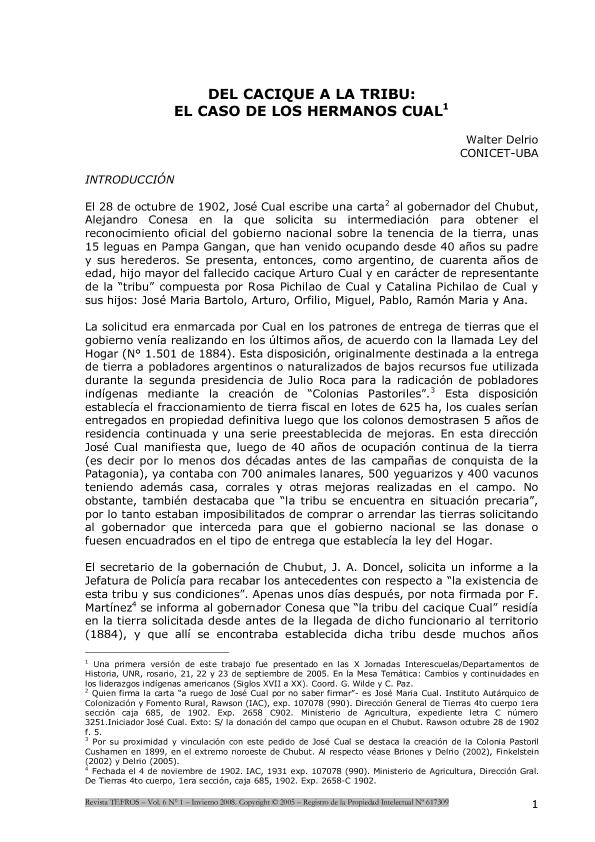Mostrar el registro sencillo del ítem
dc.contributor.author
Delrio, Walter Mario

dc.date.available
2019-09-10T20:36:08Z
dc.date.issued
2008-12
dc.identifier.citation
Delrio, Walter Mario; Del cacique a la tribu: el caso de los hermanos Cual; Universidad Nacional de Río Cuarto. Facultad de Humanidades; Tefros; 6; 1; 12-2008; 1-15
dc.identifier.issn
1669-726X
dc.identifier.uri
http://hdl.handle.net/11336/83304
dc.description.abstract
La década de 1930 esta signada por un extendido proceso de expropiaciones de los pueblos originarios en toda la Patagonia. Este trabajo aborda a través de un caso -la demanda por la tierra iniciada en abril de 1934 por los hermanos Cual y otros pobladores de Gangan (territorio nacional de Chubut) las nuevas orientaciones del posicionamiento indígena en sus negociaciones con las autoridades nacionales y de los territorios. Este posicionamiento público comenzará a construirse más sobre la visibilidad de la “tribu” o comunidad –en términos de grupo de “pobladores indígenas argentinos”– que de la intermediación de un “cacique” o representante político. En este proceso de negociación se exponen los usos situados de ambos términos -cacique y tribu- por parte de agencias estatales y de los pueblos originarios, como también el auto-concepto de los demandantes en tanto comunidad originaria, preexistente y multiétnica. Una comunidad que recupera, construye y exige que sea puesta en consideración, una historia propia enmarcada en las genealogías territorializadas por la matriz estado-nación-territorio argentino.
dc.description.abstract
The decade of 1930 is marked by an extended process of expropriation of the originary people all over the Patagonia. Using an example (the claim of land started in April 1934 by the Cual brothers and other settlers of Gangan, national territory of Chubut) this work analyzes the new orientations of the indigenous stance in their negotiations with the national and territorial authorities. This public stance will begin to build up rather upon the visibility of the tribe” or community (in terms of group of “Argentinean indigenous settlers”) than the mediation of a “cacique” or political representative. In this negotiation process the use of both terms (cacique and tribe) are exposed by state agencies and originary people, as well as the auto-concept of the claimers as in originary, preexistent, and multiethnic community. A community that recovers, constructs, and demands to be taken into account; a history within the framework of the genealogies territorialized by the Argentinean matrix State-Nation-Territory.
dc.format
application/pdf
dc.language.iso
spa
dc.publisher
Universidad Nacional de Río Cuarto. Facultad de Humanidades

dc.rights
info:eu-repo/semantics/openAccess
dc.rights.uri
https://creativecommons.org/licenses/by-nc-sa/2.5/ar/
dc.subject
Meseta del Chubut
dc.subject
Liderazgo
dc.subject
Comunidades Mapuche- Tehuelche
dc.subject
Patagonia
dc.subject.classification
Antropología, Etnología

dc.subject.classification
Sociología

dc.subject.classification
CIENCIAS SOCIALES

dc.title
Del cacique a la tribu: el caso de los hermanos Cual
dc.title
From the cacique to the tribe: the case of the cual brothers
dc.type
info:eu-repo/semantics/article
dc.type
info:ar-repo/semantics/artículo
dc.type
info:eu-repo/semantics/publishedVersion
dc.date.updated
2019-08-27T18:19:09Z
dc.journal.volume
6
dc.journal.number
1
dc.journal.pagination
1-15
dc.journal.pais
Argentina

dc.journal.ciudad
Río Cuarto
dc.description.fil
Fil: Delrio, Walter Mario. Consejo Nacional de Investigaciones Científicas y Técnicas. Centro Científico Tecnológico Conicet - Patagonia Norte. Instituto de Investigaciones en Diversidad Cultural y Procesos de Cambio. Universidad Nacional de Río Negro. Instituto de Investigaciones en Diversidad Cultural y Procesos de Cambio; Argentina. Universidad de Buenos Aires; Argentina
dc.journal.title
Tefros

dc.relation.alternativeid
info:eu-repo/semantics/altIdentifier/url/http://www.hum.unrc.edu.ar/ojs/index.php/tefros/article/view/168
Archivos asociados
